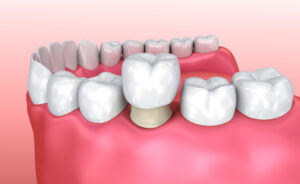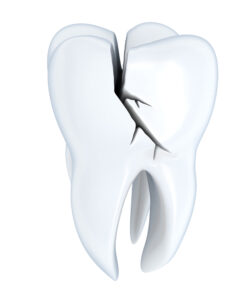Is a Dental Crown Necessary with a Root Canal Procedure?
 Most people do not think about this question until they find themselves in need of a root canal procedure. Then as the treatment plan develops, they see the list of treatments that accompany a root canal procedure and start asking this very question.
Most people do not think about this question until they find themselves in need of a root canal procedure. Then as the treatment plan develops, they see the list of treatments that accompany a root canal procedure and start asking this very question.
In this week’s blog, we will answer this question thoroughly so that you can understand the reasons that many dental procedures must go together for long-term success.
What is a Root Canal Procedure?
A root canal treatment is a dental procedure that removes the nerves and blood vessels from the hollow center of a tooth. Root canal treatments are necessary when the nerve and blood vessel tissue becomes irreversibly damaged by infection or trauma. This tissue does not have the ability to heal itself, so it must be removed in order for you to keep the tooth.
Your dentist cleans the hollow center of the tooth and its roots, removing all of the infected or dying tissue. Then she disinfects the internal surfaces and seals them with a biocompatible root filling. A root canal procedure requires multiple dental x-rays and three-dimensional images to guide the cleaning and filling.
What is a Dental Crown?
 A dental crown, sometimes called a “cap”, covers the entire exposed portion of a tooth. It does not extend under the gums or cover the tooth’s roots. Crowns are necessary when teeth suffer breakdown or damage that prevents them from fully functioning. That damage can be the result of large decay, fractures, or old dental work that is failing.
A dental crown, sometimes called a “cap”, covers the entire exposed portion of a tooth. It does not extend under the gums or cover the tooth’s roots. Crowns are necessary when teeth suffer breakdown or damage that prevents them from fully functioning. That damage can be the result of large decay, fractures, or old dental work that is failing.
A crowns covers and protects the tooth so that it can undergo normal chewing forces. It also rebuilds the tooth back to its normal shape and size.
Why is a Dental Crown Necessary with a Root Canal Procedure?
Because a root canal treatment removes all of the nerves and blood vessels from the hollow chamber of the tooth, the tooth is left with no fluid supply. It becomes dehydrated, which makes the tooth brittle, and very likely to crack. This weakness prevents it from fully functioning with long-term success.
For this reason, most teeth that undergo root canal treatments do require crowns to cover them.
Is a Dental Crown ALWAYS Necessary with a Root Canal Procedure?
You may have noticed that, in that last sentence above, we said “most teeth”. This is because there are some rare cases in which a tooth has enough natural strength to continue functioning well after a root canal treatment.
These situations would include teeth that do not have any existing dental work on them (i.e. no fillings). These teeth must also have healthy enamel with no decay and no fractures.
You may be wondering why a tooth with no decay or fractures would need a root canal treatment in the first place. Great question!
In some cases, a tooth requires a root canal treatment because the nerve and blood vessel tissue has undergone trauma and died. The trauma does not necessarily damage the hard tooth structure, only the soft tissue inside. This means a tooth can have perfectly healthy and intact enamel and need a root canal treatment. This is a perfect scenario for a root canal treatment that does not require a crown afterward.
What if I do not Follow Through with a Dental Crown after a Root Canal Procedure?
 We have seen many teeth that underwent root canal treatments but did not receive the protection of a dental crown. For some, the reason was financial constraints. For others, they simply did not understand the need for the follow-up treatment of a dental crown. Whatever the cause, the tooth remained without the coverage of a crown.
We have seen many teeth that underwent root canal treatments but did not receive the protection of a dental crown. For some, the reason was financial constraints. For others, they simply did not understand the need for the follow-up treatment of a dental crown. Whatever the cause, the tooth remained without the coverage of a crown.
Most of these teeth are too weak to survive long without a dental crown. They will suffer from fractures that can extend all the way down the roots. This is the worst consequence of not covering the tooth because it makes the tooth impossible to save. A root fracture has no treatment that will adequately repair and restore the tooth to function. So the tooth is hopeless, and the root canal was basically worthless.
The real danger behind this situation is that, because the tooth no longer contains a nerve inside, it does not cause pain to alert you to a problem. A tooth that has a nerve will let you know when a fracture is present. You would feel pain when chewing or drinking ice-cold beverages. A tooth with a root canal will not hurt until a dangerous infection is present.
If you have had a root canal on a tooth, it is important to see a dentist regularly to monitor its health and help you keep it functioning well. Your dentist will take x-rays of the root canal treatment once each year to confirm its success.
More Questions about Crowns and Root Canals?
Call Designer Smiles today to schedule a consultation with Dr. Ann. She can answer any question you have about dental crowns or root canal treatments. She will assess your specific situation and advise you of your treatment options for the best long-term success.
